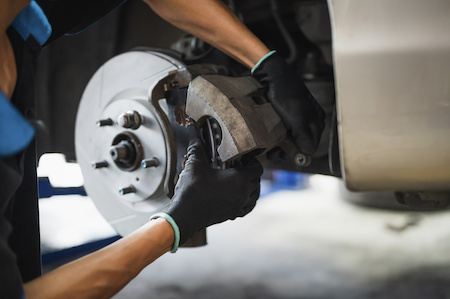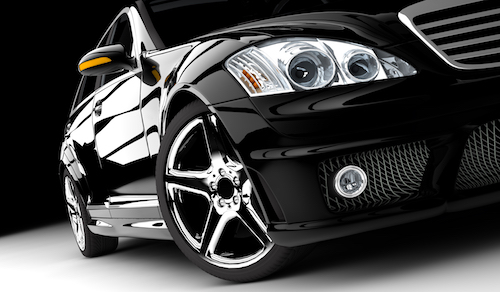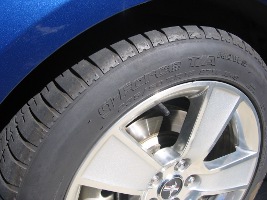In the whirlwind of life’s demands, Aileen is a mom, a professional, and a woman perpetually on the move. With two kids in tow and a job that navigates her through the city’s hustle, Aileen’s vehicle isn’t just a means of transport; it’s the unsung hero of her daily adventures.
A typical morning includes coffee in hand, a to-do list in mind, and Aileen ready to conquer the week. Yet, amidst the organized chaos, a sudden interruption: a subtle sputter and the ominous glow of a dashboard light. Panic ensues as Aileen realizes her trusted companion, her vehicle, is hinting at a potential hiccup, threatening to derail her precisely planned schedule.
If you’ve ever felt the dread of unexpected car troubles, you’re not alone. Aileen’s story resonates with countless individuals who rely on their vehicles to keep up with life’s fast pace.
What if your brakes squeal? What if you know you need brake repair?
What next?
Pay attention to what’s happening with your car
The worst thing you can do is ignore your vehicle.
We get busy. We have lots of things on our minds. But cars slowly degrade until they reach a point where they need a little care. The sooner you catch it, the easier the repair, the lower the potential cost will be.
For a mom like Aileen, that’s important. She lives on a budget – why pay more for repairs if she can maintain her car and avoid bigger problems?
It’s also a matter of safety. She carries her kids to activities each day. She often has other kids in her car. Safety matters.
Which is why it’s important to pay attention.
Ever noticed a high-pitched squeal or a grinding noise when you hit the brakes? It’s like your car is trying to tell you something. Usually, these sounds are red flags indicating worn-out brake pads or, in more serious cases, damaged rotors. Don’t let these audible alarms go unnoticed – they’re your vehicle’s way of saying, “Hey, I need some attention!”
Or maybe you notice the way your brake pedal responds. If it suddenly feels spongy, requires more pressure, or, on the flip side, becomes overly sensitive, it’s time to pay attention. Changes in pedal feel might suggest issues with your brake fluid or a potential brake system malfunction. Ignoring these signs could compromise your ability to stop safely.
Imagine hitting the brakes, and there’s an unexpected shimmy or vibration steering your car. This might be an indication of warped brake rotors. While it might not feel like an urgent concern, letting this issue linger can lead to uneven brake pad wear and, ultimately, a compromised braking performance.
Simple things to do for brake repair …
Today’s cars are sophisticated vehicles. While each system is put together with dozens of parts, technology is what holds it all together. Vehicles are as much technology-driven as they are mechanically inclined.
It’s why you should bring your vehicle to a qualified, reputable mechanic at the first sign of trouble.
Still, there are things you can do – so you’re not running into an auto repair shop at every sound.
Start with a visual check. Even if you know very little about car maintenance, you can notice certain problems. Is there fluid underneath your car when you drive away? Where is it located? What color is it? You can even peek through the spokes of your wheels to get a glimpse of your brake components. Does one wheel look differently than another?
Remember those sounds we talked about? Take a moment in a quiet space to listen as you lightly tap the brakes. Squeals, squeaks, or grinding noises might signal wear and tear. If you hear something unusual, it’s worth scheduling a check-up.
Sit in your car, start the engine, and gently press the brake pedal. It should feel firm, not mushy. If it feels soft or requires excessive effort, it’s worth investigating. Also, pay attention to any vibrations or pulsations, as these could hint at rotor issues.
Your car’s brake fluid is crucial for optimal brake performance. Pop the hood, locate the brake fluid reservoir, and check the level. If it’s low, it might indicate a leak or wear in the brake system. Ensure the fluid is clear and doesn’t look murky or discolored. And if there’s a leak, it’s time to bring your vehicle in for repair.
Believe it or not, tire rotation plays a role in brake health. Regularly rotating your tires ensures even wear on brake pads and extends their lifespan. Plus, it contributes to a smoother ride. And it gives a trusted mechanic a chance to ensure other items aren’t in disrepair.
Ensuring your car’s safety as you go …
In the ebb and flow of city traffic, your brakes become your constant companion. Frequent stops and accelerations take a toll on brake pads. Well-maintained brakes not only ensure a smoother driving experience but also contribute to fuel efficiency by minimizing unnecessary friction.
Of course, life isn’t all about normalcy. Your brakes need to be ready for the unexpected, too.
Imagine you’re rushing to pick up the kids from school, and a car unexpectedly swerves in front of you. Your ability to bring your vehicle to a swift and controlled stop depends on the efficiency of your brakes. Regular maintenance ensures they’re up to the task when split-second decisions are crucial.
Sometimes, you can’t see what’s in your path. Whether it’s a sudden pothole or an unexpected obstacle in the road, well-maintained brakes provide the responsiveness needed to navigate unforeseen challenges. It’s your first line of defense against the unpredictable nature of daily driving.
And it’s not just about you. Your car is more than a mode of transportation; it’s a shield for you and your loved ones. Well-maintained brakes are a fundamental component of your vehicle’s safety system. Investing time in their care is an investment in the safety of everyone on board.
So, let me ask you a question: Are you an Aileen? Do you drive all over town, rarely thinking of your car’s brakes?
Maybe it’s time for a change. Awareness is key. It sets the stage for a better driving experience overall. And ensuring your safety no matter where the road takes you.
Can we assist you with your brake repair?



